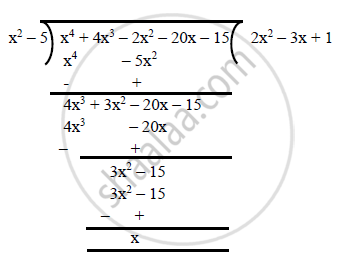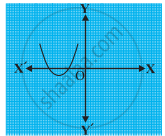Advertisements
Advertisements
Question
Obtain all other zeroes of `(x^4 + 4x^3 – 2x^2 – 20x – 15)` if two of its zeroes are `sqrt5 and –sqrt5.`
Solution
The given polynomial is` f(x) = x^4 + 4x^3 – 2x^2 – 20x – 15.`
Since `(x – sqrt5) and (x + sqrt5)` are the zeroes of f(x) it follows that each one of `(x – sqrt5) and (x + sqrt5)` is a factor of f(x).
Consequently, `(x – sqrt5) (x + sqrt5) = (x2 – 5)` is a factor of f(x).
On dividing f(x) by (x2 – 5), we get:

`f(x) = 0`
`⇒ x^4 + 4x^3 – 7x^2 – 20x – 15 = 0`
`⇒ (x^2 – 5) (x2 + 4x + 3) = 0`
`⇒ (x – sqrt5) (x + sqrt5) (x + 1) (x + 3) = 0`
`⇒ x = sqrt5 or x = -sqrt5 or x = -1 or x = -3`
Hence, all the zeroes are sqrt5, -sqrt5, -1 and -3.
APPEARS IN
RELATED QUESTIONS
The graphs of y = p(x) are given in following figure, for some polynomials p(x). Find the number of zeroes of p(x).

Find the zeroes of the polynomial `f(x) = x^2 ˗ 2x ˗ 8` and verify the relation between its zeroes and coefficients
One zero of the polynomial `3x^3+16x^2 +15x-18 is 2/3` . Find the other zeros of the polynomial.
If f(x) =`x^3-3x+5x-3` is divided by g(x)=`x^2-2`
Find all the zeroes of polynomial `(2x^4 – 11x^3 + 7x^2 + 13x – 7)`, it being given that two of its zeroes are `(3 + sqrt2) and (3 – sqrt2)`.
If one zero of the polynomial `x^2-4x+1 is (2+sqrt3)` , write the other zero.
Write the zeros of the polynomial `f(x) = x^2 – x – 6`.
If 𝛼 and 𝛽 be the zeroes of the polynomial `2x^2 - 7x + k` write the value of (𝛼 + 𝛽+ 𝛼 𝛽.
The number of polynomials having zeroes as -2 and 5 is ______.
If f(x) = 5x - 10 is divided by x – `sqrt2`, then the remainder will be ______.
